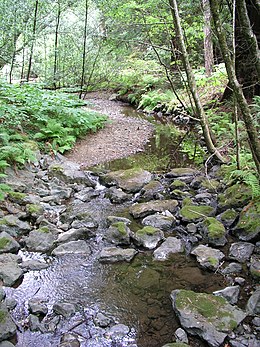
Summary
| |
|
Ecology
|
|
Ecology (from Ancient Greek οἶκος (oîkos) 'house', and -λογία (-logía) 'study of') is the natural science of the relationships among living organisms, including humans, and their physical environment. Ecology considers organisms at the individual, population, community, ecosystem, and biosphere level. Ecology overlaps with the closely related sciences of biogeography, evolutionary biology, genetics, ethology, and natural history. Ecology is a branch of biology, and is the study of abundance, biomass, and distribution of organisms in the context of the environment. It encompasses life processes, interactions, and adaptations; movement of materials and energy through living communities; successional development of ecosystems; cooperation, competition, and predation within and between species; and patterns of biodiversity and its effect on ecosystem processes. Ecology has practical applications in conservation biology, wetland management, natural resource management (agroecology, agriculture, forestry, agroforestry, fisheries, mining, tourism), urban planning (urban ecology), community health, economics, basic and applied science, and human social interaction (human ecology). The word ecology (German: Ökologie) was coined in 1866 by the German scientist Ernst Haeckel. The science of ecology as we know it today began with a group of American botanists in the 1890s. Evolutionary concepts relating to adaptation and natural selection are cornerstones of modern ecological theory. Ecosystems are dynamically interacting systems of organisms, the communities they make up, and the non-living (abiotic) components of their environment. Ecosystem processes, such as primary production, nutrient cycling, and niche construction, regulate the flux of energy and matter through an environment. Ecosystems have biophysical feedback mechanisms that moderate processes acting on living (biotic) and abiotic components of the planet. Ecosystems sustain life-supporting functions and provide ecosystem services like biomass production (food, fuel, fiber, and medicine), the regulation of climate, global biogeochemical cycles, water filtration, soil formation, erosion control, flood protection, and many other natural features of scientific, historical, economic, or intrinsic value. (Full article...) Selected article - River ecosystems are flowing waters that drain the landscape, and include the biotic (living) interactions amongst plants, animals and micro-organisms, as well as abiotic (nonliving) physical and chemical interactions of its many parts. River ecosystems are part of larger watershed networks or catchments, where smaller headwater streams drain into mid-size streams, which progressively drain into larger river networks. The major zones in river ecosystems are determined by the river bed's gradient or by the velocity of the current. Faster moving turbulent water typically contains greater concentrations of dissolved oxygen, which supports greater biodiversity than the slow-moving water of pools. These distinctions form the basis for the division of rivers into upland and lowland rivers. The food base of streams within riparian forests is mostly derived from the trees, but wider streams and those that lack a canopy derive the majority of their food base from algae. Anadromous fish are also an important source of nutrients. Environmental threats to rivers include loss of water, dams, chemical pollution and introduced species. A dam produces negative effects that continue down the watershed. The most important negative effects are the reduction of spring flooding, which damages wetlands, and the retention of sediment, which leads to the loss of deltaic wetlands. (Full article...)Selected image - Credit: User: Lamiot General imagesThe following are images from various ecology-related articles on Wikipedia.
Related WikiProjectsWikiProject Ecology
Things you can do
|
| “ | The two most abundant forms of power on earth are solar and wind, and they're getting cheaper and cheaper… | ” |
| — Ed Begley Jr. |
Ecology news
- April 23: European Union to reduce carbon emissions by 55% of 1990 levels by 2030
- November 27: Wikinews interviews Craig Farquharson, Liberal Democrat candidate for 2020 Groom by-election
- November 27: Wikinews interviews Sandra Jephcott, Sustainable Australia candidate for 2020 Groom by-election
- December 14: Greta Thunberg named 2019 Time Person of the Year
- November 23: Researchers break down deaths due to power plant pollution in the United States
- November 21: Slippery business: Materials scientists invent new coating for self-cleaning, water-efficient toilets
- October 19: Northern Arapaho Tribe welcomes buffalo herd in Wyoming, United States
- October 12: Scientists describe how 'upside-down rivers' of warm water break Antarctica's ice shelf
- October 5: Voracious fish defend coral reefs against warming, say scientists
- September 8: Scientists report skyrocketing phytoplankton population in aftermath of Kīlauea eruption
- November 5, 2009: "New ocean forming in African desert."
Selected publication -
Frontiers in Ecology and the Environment is a peer-reviewed scientific journal. It is published ten times per year by the Ecological Society of America and is its official journal. Its focus is on present day concerns pertaining to ecological and environmental issues. (Full article...)
Related portals
More did you know -
Related articles
Associated Wikimedia
The following Wikimedia Foundation sister projects provide more on this subject:
-
 Commons
Commons
Free media repository -
 Wikibooks
Wikibooks
Free textbooks and manuals -
 Wikidata
Wikidata
Free knowledge base -
 Wikinews
Wikinews
Free-content news -
 Wikiquote
Wikiquote
Collection of quotations -
 Wikisource
Wikisource
Free-content library -
 Wikiversity
Wikiversity
Free learning tools -
 Wiktionary
Wiktionary
Dictionary and thesaurus
Web resources
- Stanford Encyclopedia of Philosophy – Ecology
- The Encyclopedia of Earth – Ecology
- The Nature Education Knowledge Project – Ecology
- National Geographic – Ecology
-
 List of all portals
List of all portals -
 The arts portal
The arts portal -
 Biography portal
Biography portal -
 Current events portal
Current events portal -
 Geography portal
Geography portal -
 History portal
History portal -
 Mathematics portal
Mathematics portal -
 Science portal
Science portal -
 Society portal
Society portal -
 Technology portal
Technology portal -
 Random portal
Random portal -
 WikiProject Portals
WikiProject Portals


















































